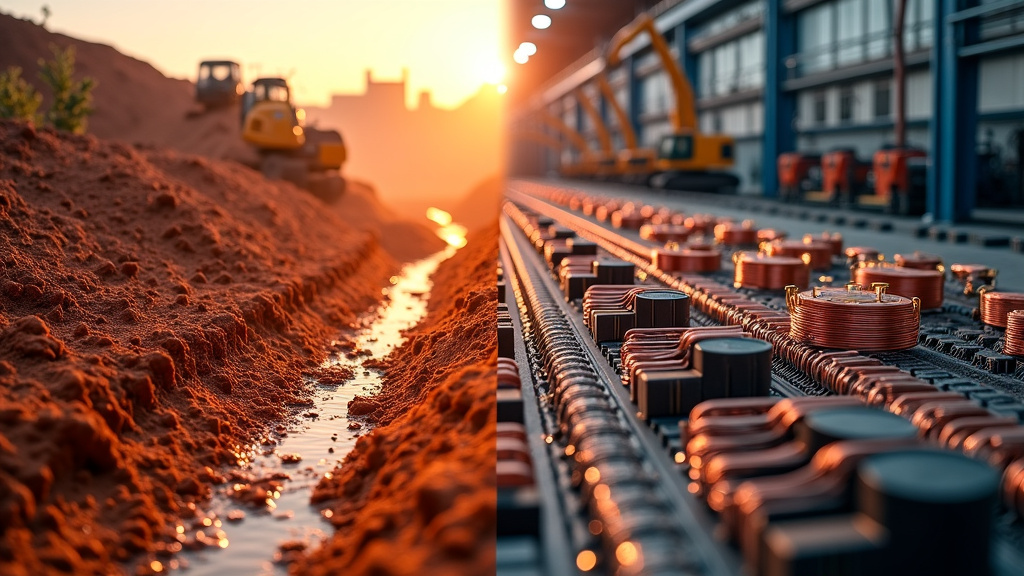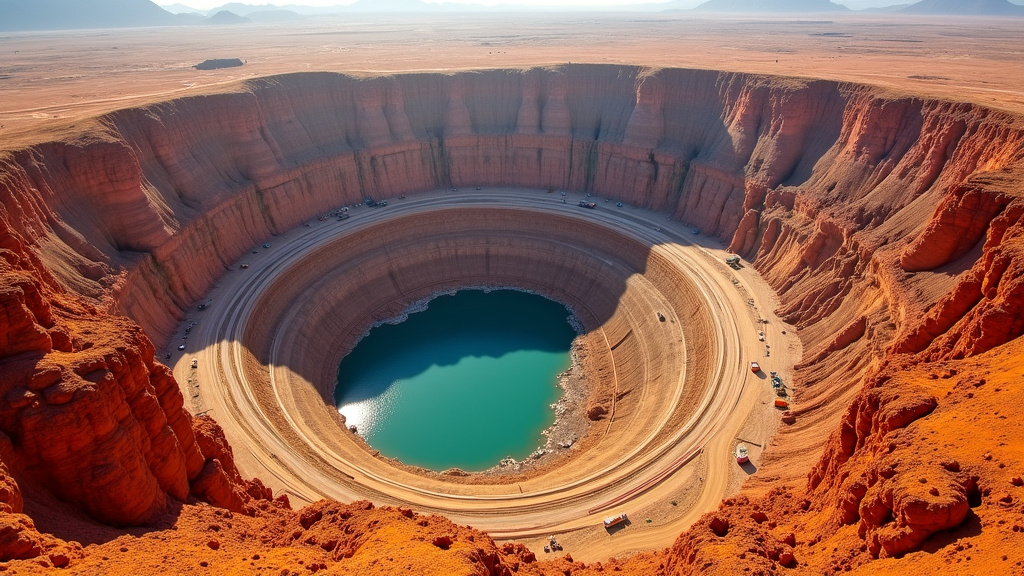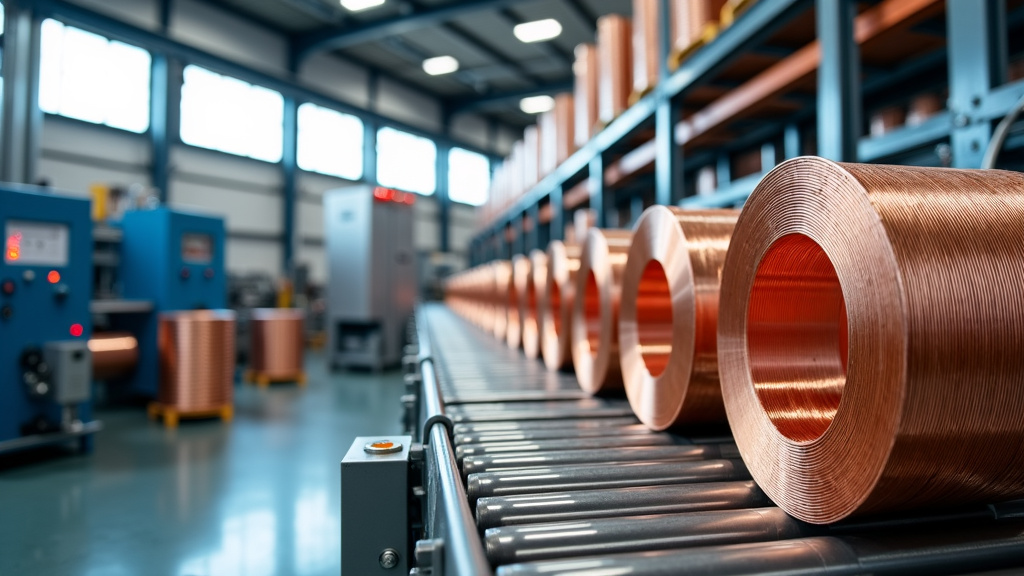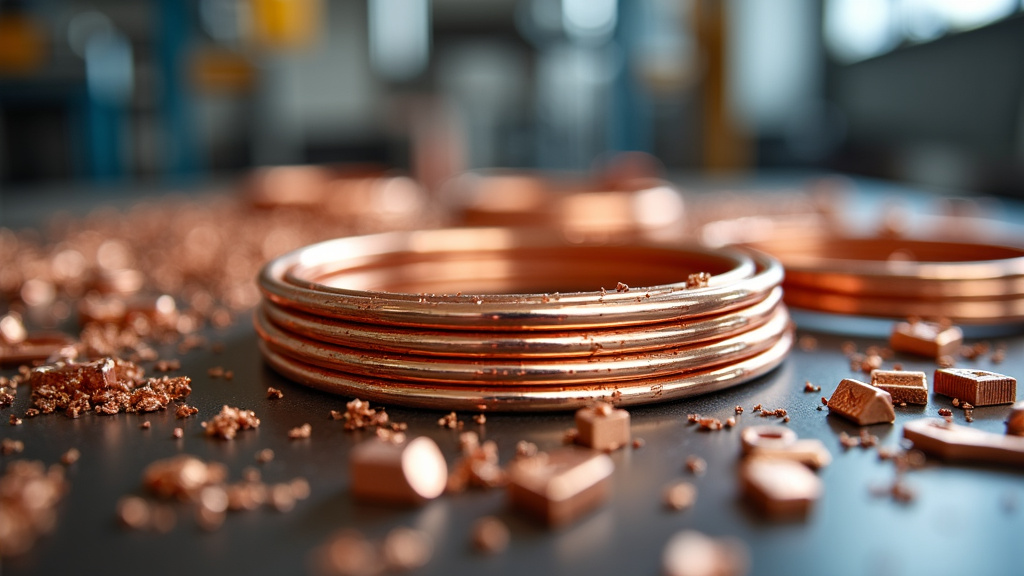5901 Botham Jean Blvd, Dallas, TX 75215
Understanding Virgin Copper: What It Is and Why It Matters
March 21, 2025Imagine a world without smartphones, electric vehicles, or renewable energy systems. That’s the reality we’d face without virgin copper. Its exceptional electrical conductivity makes it indispensable in our increasingly electrified society. From the intricate circuitry in your laptop to the massive wind turbines generating clean energy, virgin copper is the unsung hero powering our technological advancements.
However, the extraction of virgin copper comes at a significant environmental cost. Open-pit mining, the most common method of copper extraction, leaves massive scars on the landscape. These operations often involve the removal of vast amounts of earth, leading to habitat destruction and potential water contamination. As images of large-scale copper mines reveal, the environmental footprint is undeniably substantial.
So, why does virgin copper matter? Its importance lies in balancing our technological needs with environmental stewardship. As we push towards a more sustainable future, understanding the impacts of virgin copper extraction becomes crucial. It challenges us to innovate, seeking ways to meet our copper demands while minimizing ecological damage.
The conversation around virgin copper isn’t just about metal – it’s about our relationship with the Earth’s resources. It prompts us to question: How can we satisfy our growing need for copper while protecting our planet? This dilemma is central to modern sustainability efforts, making virgin copper a focal point in discussions about responsible resource management and technological progress.
Virgin Copper vs. Recycled Copper: A Comparison

The debate between virgin and recycled copper is gaining traction as industries worldwide seek more sustainable practices. While both forms are crucial to our modern economy, their environmental impacts and production processes differ significantly. Here is a comprehensive comparison of these two copper sources.
Environmental Impact
Recycled copper takes a clear lead in environmental considerations. According to CalRecycle, recycling copper uses up to 85% less energy compared to mining and processing virgin copper. This substantial energy reduction translates directly into lower greenhouse gas emissions and a smaller carbon footprint.
Virgin copper extraction involves extensive mining operations, often leading to habitat destruction, soil erosion, and water pollution. In contrast, recycled copper helps mitigate these consequences by reducing the demand for new mining activities. It exemplifies how the circular economy can benefit our planet.
Moreover, recycling copper conserves valuable natural resources. As ore grades decline, extracting virgin copper becomes increasingly energy-intensive and environmentally taxing. By opting for recycled copper, we extend the lifespan of existing copper reserves and reduce pressure on untapped resources.
Energy Efficiency
The energy savings associated with recycled copper are significant. Recycling requires much less energy than extracting and refining virgin copper from ore. This efficiency not only reduces production costs but also aligns with global efforts to combat climate change.
Producing new copper from raw ore demands extensive mining, transportation, and refining processes. Each step consumes substantial energy and contributes to carbon emissions. Recycled copper bypasses many of these energy-intensive stages, resulting in a leaner, greener production process.
Quality and Performance
A common misconception is that recycled materials are inferior in quality. However, with copper, this isn’t true. Copper can be recycled repeatedly without losing its inherent properties or performance capabilities.
There’s no discernible difference between virgin and recycled copper in terms of quality or conductivity. Both can be used interchangeably across various applications, from electrical wiring to plumbing systems. This equivalence in performance makes recycled copper an attractive option for industries seeking to reduce their environmental impact without compromising product quality.
Economic Considerations
While virgin copper mining has traditionally been a significant economic driver in certain regions, the recycling industry is creating new economic opportunities. Copper recycling supports jobs in collection, processing, and redistribution, contributing to a more diversified and sustainable economy.
As copper demand grows, particularly in renewable energy technologies and electric vehicles, recycled copper can help buffer against potential supply shortages and price volatility. It provides a valuable secondary source of this essential metal, enhancing supply chain resilience.
Future Outlook
As we move towards a more sustainable future, the importance of recycled copper is set to grow. Innovations in recycling technologies and increased awareness of environmental issues are likely to boost recycling rates. However, recycled copper alone cannot meet the world’s increasing demand for this versatile metal.
The future will likely see a balanced approach, combining responsible mining practices for virgin copper with enhanced recycling efforts. This strategy will be crucial in meeting the copper demands of emerging technologies while minimizing environmental impact.
In conclusion, while both virgin and recycled copper have their place in the global market, the environmental and energy efficiency benefits of recycled copper are undeniable. As industries and consumers become more environmentally conscious, the shift towards greater use of recycled copper represents a significant step towards a more sustainable and circular economy.
The Environmental Impact of Virgin Copper Production

The extraction and processing of virgin copper have significant environmental costs, impacting ecosystems and communities globally. As demand surges due to the clean energy shift and technological progress, it is essential to assess the true ecological footprint of this crucial metal.
Deforestation is a prominent impact of copper mining. Large-scale open-pit mines often require clearing vast land areas, destroying habitats and disrupting biodiversity. In Chile’s Atacama Desert, home to some of the largest copper reserves, mining has led to the degradation of surrounding ecosystems, threatening unique flora and fauna adapted to this arid environment.
Water Pollution and Resource Depletion
Copper mining is water-intensive, placing immense pressure on local water resources, leading to pollution and scarcity issues. Extracting copper from ore often involves toxic chemicals that can leach into groundwater and nearby water bodies. Acid mine drainage, where acidic water flows from mining sites, poses a severe threat to aquatic ecosystems and drinking water sources.
A recent study found that approximately 66% of the world’s largest mines are located in water-stressed countries, worsening an already critical situation. In Chile, the world’s top copper producer, mining operations in the Atacama Desert compete with local communities and agriculture for scarce water resources.
Greenhouse Gas Emissions and Climate Impact
The energy-intensive nature of copper production significantly contributes to greenhouse gas emissions. From heavy machinery in extraction to smelting and refining processes, each production stage relies heavily on fossil fuels. The mining industry accounts for approximately 11% of total global greenhouse gas emissions, with copper extraction playing a substantial role.
Producing one ton of copper can generate up to 4 tons of CO2 emissions. As demand is projected to double by 2050, driven largely by renewable energy technologies and electric vehicles, the climate impact of copper production could become even more pronounced without significant interventions.
Towards More Sustainable Practices
Recognizing these environmental challenges, the copper industry is focusing on developing more sustainable practices. Innovations in water recycling, renewable energy adoption, and ore processing efficiency are beginning to make a difference. Some mining companies are using desalination plants and advanced water treatment technologies to reduce freshwater consumption and minimize pollution.
The circular economy concept is gaining traction in the copper sector. Currently, about 32% of copper used annually comes from recycling, with the potential for this figure to increase significantly. Boliden, a European mining company, has launched low-carbon copper products with emissions approximately 38% lower than the global average, demonstrating the industry’s capacity for improvement.
As awareness of the environmental costs associated with virgin copper production grows, there is increasing support for sustainable mining practices and greater use of recycled copper. By making informed choices and advocating for responsible production methods, we can help mitigate the environmental impact of this crucial metal while meeting the world’s copper needs in our transition to a greener future.
How Okon Recycling Can Help with Virgin Copper Alternatives

In today’s world, where sustainability is a necessity, Okon Recycling stands out as a leader in the copper recycling industry. With over a century of experience, this Dallas-based company has perfected the art and science of reviving used copper, offering a compelling alternative to virgin copper extraction.
Okon’s approach to copper recycling is innovative. By leveraging cutting-edge technology and decades of expertise, they have developed processes that not only reclaim copper but also meet or exceed industry standards for quality. This is crucial because many industries require high-purity copper, particularly in the electrical and electronic sectors.
What sets Okon apart is their commitment to preserving the inherent properties of copper throughout the recycling process. Unlike some materials that degrade with recycling, copper can be reused indefinitely without losing its conductive properties. Okon capitalizes on this, ensuring their recycled copper is as effective as newly mined copper for a wide range of applications.
Environmental Benefits of Choosing Recycled Copper
The environmental benefits of opting for Okon’s recycled copper are significant. According to the World Resources Institute, recycling copper can save up to 85% of the energy needed for mining and extraction. This translates to a substantial reduction in carbon emissions and overall environmental impact.
Okon’s process not only conserves energy but also helps preserve natural resources. By reducing the demand for virgin copper, they play a crucial role in mitigating the environmental degradation associated with copper mining. This includes preventing soil erosion, minimizing water pollution, and reducing habitat destruction.
Furthermore, Okon’s recycling services help divert significant amounts of copper from landfills. This is particularly important given the growing global issue of electronic waste, which often contains valuable copper components that can and should be recycled.
Economic Advantages for Businesses
Choosing Okon Recycling’s services isn’t just environmentally conscious—it’s a smart business move. Recycled copper from Okon is often more cost-effective than virgin copper, allowing businesses to reduce their raw material costs without compromising quality.
Moreover, partnering with Okon can help companies improve their sustainability metrics and enhance their corporate social responsibility profiles. In an era where consumers and investors increasingly value environmental stewardship, this can translate into tangible business benefits.
Okon’s services are particularly valuable for industries that generate copper waste as part of their operations. By implementing Okon’s recycling solutions, these businesses can turn a waste management challenge into a potential revenue stream.
Innovative Processes for High-Quality Recycled Copper
At the heart of Okon’s success is their innovative recycling process. They employ advanced sorting and purification techniques to ensure the recycled copper meets stringent quality requirements. This includes methods for removing impurities and contaminants that could affect the copper’s performance.
Okon’s state-of-the-art facility is equipped with the latest recycling technology, allowing them to process a wide range of copper-containing materials efficiently. From industrial scrap to end-of-life electronics, Okon can extract and refine copper from diverse sources.
The company’s commitment to innovation extends beyond their current processes. Okon continually invests in research and development to improve their recycling techniques, always striving to increase efficiency and reduce environmental impact further.
A Century of Expertise in Sustainable Solutions
Okon Recycling’s century-long history in the industry is a testament to their adaptability and forward-thinking approach. Over the decades, they’ve evolved from a traditional scrap metal business into a cutting-edge recycling operation at the forefront of sustainability efforts.
This rich history translates into unparalleled expertise. Okon’s team of professionals understands the intricacies of copper recycling like few others in the industry. They provide tailored solutions for businesses of all sizes, from small local operations to large multinational corporations.
By choosing Okon Recycling, businesses aren’t just getting a service provider—they’re partnering with a company that has sustainability in its DNA. Okon’s commitment to environmental stewardship aligns perfectly with the growing global emphasis on circular economy principles and responsible resource management.
Okon Recycling offers a compelling alternative to virgin copper, combining environmental benefits with economic advantages. Their innovative processes, backed by a century of experience, ensure businesses can reduce their reliance on newly mined copper without sacrificing quality or performance. As we move towards a more sustainable future, companies like Okon are leading the way, demonstrating that recycling isn’t just about waste management—it’s about creating value and preserving our planet for future generations.
| Aspect | Recycled Copper | Virgin Copper |
|---|---|---|
| Energy Usage | 85% less energy | 100% (baseline) |
| CO2 Emissions Reduction | 65% less emissions | Higher emissions due to mining |
| Cost | Up to 13 times cheaper | More expensive due to extraction costs |
| Environmental Impact | Reduces landfill waste, conserves resources | Habitat destruction, water pollution |
The Future of Copper: Balancing Demand and Sustainability

At the intersection of technological progress and environmental responsibility, the future of copper is a critical consideration. The increasing demand for this versatile metal, driven by renewable energy technologies and electrification, presents both challenges and opportunities. By 2050, global copper demand is expected to increase by at least 50%, necessitating innovative approaches to ensure sustainable supply.
Recycling is a beacon of hope in this context. Copper’s unique property of being 100% recyclable without any loss of performance makes it ideal for circular economy practices. Currently, about one-third of the world’s copper supply comes from recycled sources, but there is immense potential to expand this further. By doubling the global end-of-life copper recycling rates from 32% to 66%, over 6 million tons of copper could be recovered annually from landfills by 2040—equivalent to more than 16 Empire State Buildings made entirely of copper.
Innovative technologies are paving the way for more efficient copper recycling processes. Advanced sorting and refining techniques enable the recovery of copper from increasingly complex products, such as electronic waste. These advancements not only conserve valuable resources but also significantly reduce energy consumption and CO2 emissions associated with primary copper production.
The transition to a more sustainable copper future requires collaboration across industries and sectors. Manufacturers can design products with end-of-life recycling in mind, while policymakers can create frameworks that incentivize recycling and circular economy practices. Consumers also play a crucial role by making informed choices and supporting recycling initiatives.
As we embrace this sustainable vision for copper, companies like Okon Recycling are at the forefront of driving change. With expertise in metal recycling and sustainable solutions, Okon Recycling is well-positioned to assist businesses and communities in their journey toward more responsible copper use. To learn more about contributing to a sustainable copper future or to explore recycling solutions, contact Okon Recycling at 214-717-4083.
